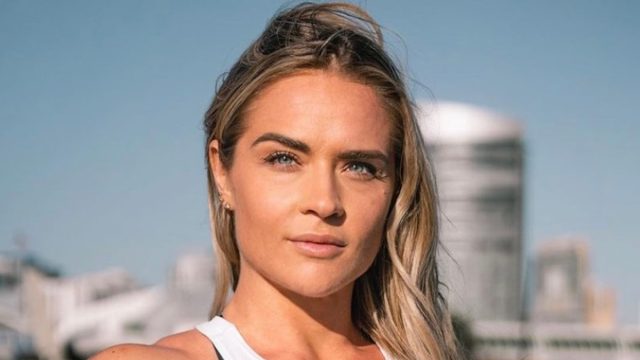Powerlifter Kristen Dunsmore in Two-Piece Workout Gear Prepares for “Stronger Return”

Kristen Dunsmore is staying fit during the off season in her workout gear. In a new social media post the powerlifter shows off her amazing body – including her rock hard abs – in a sports bra and leggings during an intense workout session. “Transitioning into the off-season has cone with expected challenges. This phase can often feel directionless without the urgency of competition, but I’m refocused by setting specific goals for myself unrelated to powerlifting. Having a structured routine and keeping track of progress has been influential in regaining that drive. Today’s deadlift session was a testament to that, with a solid top single at 200kg (441 lbs). The weight was slow off the ground, but it moved well, and I feel my technique is steadily improving. I’m confident this off-season will set me up for an even stronger return,” she captioned the Instagram video. How does she approach diet, fitness, and self-care? Here is everything you need to know about her lifestyle habits.
Low-Fiber, High-Energy Diet
“The safest way to lose weight without impacting performance in powerlifting is to consume a low-fiber, high-energy density diet. While fiber is crucial for long-term gut health and is one of the reasons fruits, vegetables, and whole grains are considered part of a balanced diet, it also slows the digestive process and increases fecal matter in the colon. By spending 2-4 days on a diet with less than 10 grams of fiber per day, you can significantly reduce the weight of the contents in your digestive tract,” she writes in a blog on her Empower Lift website.
Focusing On Long-Term Weight-Cut
She also recommends a ong-term weight-cut strategy, that “gradually reduces body weight over several weeks or months,” she says. “This approach is less stressful on the body than rapid weight cutting and is ideal for athletes who have more time before their competition or for those who desire long-term weight loss goals rather than to make weight for a meet. Long-term diet strategies are more complex than short-term rapid weight loss goals and also require behavior changes and perceptions towards foods. Because of the uniqueness of each individual, I will only provide general recommendations for healthy strength athletes interested in improving body composition beyond making weight for a competition.”
Sleep
In another blog she explains that adequate sleep “is a cornerstone of health and wellness, often overlooked in its critical role in recovery for athletic performance,” she maintains. “Its influence extends beyond mere rest, impacting mood, cognitive function, and overall life quality, both inside and outside fitness. More sleep is needed to maintain athletic performance and improve recovery, particularly in skill- or energy-demanding activities. Sleep is a daily health behavior that significantly impacts our lives inside and outside the gym. It’s well understood that lack of sleep can adversely affect mood, cognitive performance, and overall quality of life. This connection naturally extends to fitness, where both acute sleep deprivation and chronic sleep insufficiency can impair athletic performance, especially in activities requiring high skill or volume.” She recommends getting 7 to 9 hours.
Caffeine
Kristen drinks caffeine, coffee and energy drinks. “I’ve drank some form of caffeinated beverage each morning since college,” she says, noting “there are many benefits to caffeine,” and that “caffeine is generally safe to consume for healthy individuals within reason. Typically recommended dose is no more than 400mg per day.”
Running Intervals
She also does unning intervals consisting of different speeds of distance is 3-5 mph. “If there is interval work, it’s typically in the middle of the day,” she says. “It can be running, biking, rowing, or swimming. A lot of the time, I’ll do running intervals. I’m more of a sprint and power athlete. Forcing myself to do that longer endurance stuff on the bike and running is more important to me. When I retire from CrossFit, you will never find me running again (laughs).”




